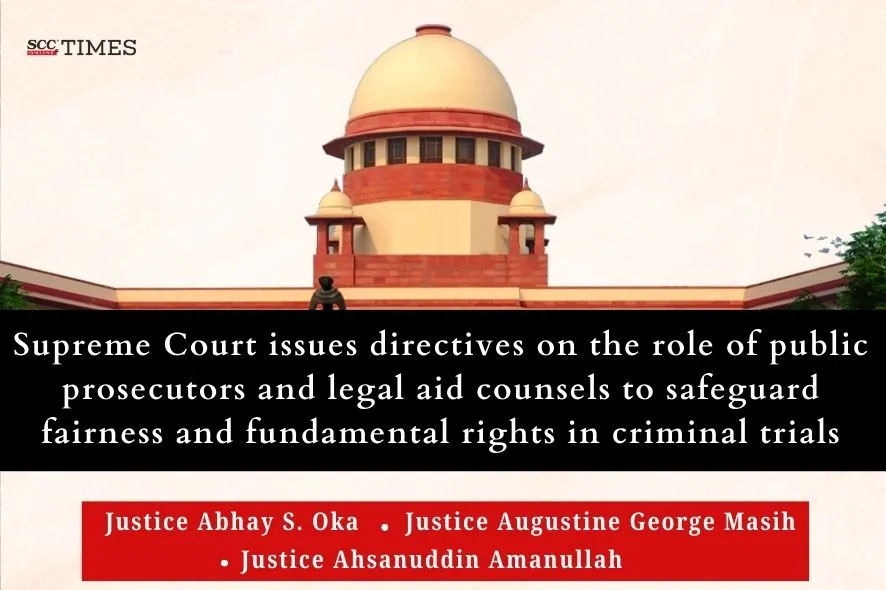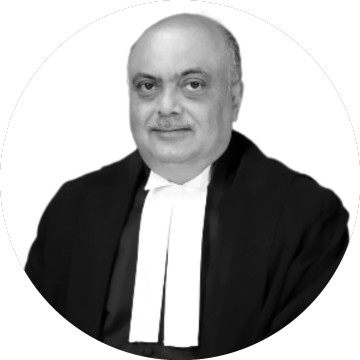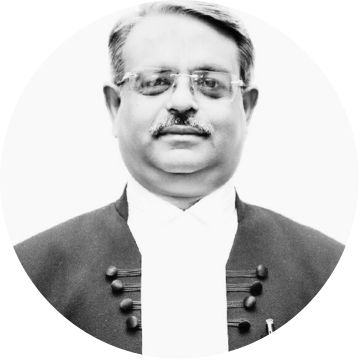Supreme Court: In a criminal appeal filed against the conviction order of a man accused of rape and murder of a ten-year-old minor, passed by the Trial Court and upheld by the Allahabad High Court, the three Judge bench of Abhay S. Oka*, Ahsanuddin Amanullah, and Augustine George Masih, JJ. set aside the conviction, as the accused was not provided with proper legal aid during the trial, which violated his fundamental right to a fair trial under Article 21 of the Constitution of India. Further, the Court issued a series of directives concerning the critical roles of the Public Prosecutor and Legal Aid Counsels in ensuring procedural fairness and safeguarding the fundamental rights of the accused in criminal trials.
Background:
In 2009, a ten-year-old victim and her seven-year-old cousin went to a pasture to graze their goats. While at the pasture, the victim, feeling thirsty, approached a nearby tubewell cabin where the accused worked as the operator. The victim requested the accused to provide drinking water. The allegation of the prosecution is that, with evil intentions, the accused took her inside the cabin. He committed rape on her and, after that, murdered her. According to the prosecution’s case, her cousin saw the accused forcibly taking the victim inside the cabin and raping her. By 11:00 a.m., the victim’s younger cousin returned to the victim’s father, and recounted the events that had occurred earlier. Concerned, the father went to the tubewell cabin in search of the victim. Upon arrival, he discovered the victim’s lifeless body concealed in a haystack within the cabin. When he confronted the accused at the scene, the accused fled the spot. Subsequently, he immediately reported the crime by registering the First Information Report (FIR), which led to the investigation of the incident.
The Trial Court, by judgment and order convicted the accused for the offences punishable under Sections 376, 302 and 201 of the Penal Code, 1860 (‘IPC’). The Trial Court also convicted the accused under the provisions of Section 3(2)(v) of the Scheduled Castes and Scheduled Tribes (Prevention of Atrocities) Act, 1989 (‘the SC/ST Act’). The Trial Court imposed capital punishment.
The High Court examined the case under Section 366 of the Code of Criminal Procedure, 1973, which pertains to the reference for confirmation of the death sentence. Alongside the reference, an appeal had been filed by the accused. While the High Court upheld the conviction of the accused, it decided to set aside the death penalty. Instead, the accused was sentenced to life imprisonment for the remainder of his natural life. The present appeal is filed against the above-mentioned orders.
Analysis and Decision:
The Court noted that by order dated 20-05-2022, this Court granted bail to the accused after noting that he had undergone actual incarceration for about 13 years.
After taking note of the evidence, the Court said that “the evidence of the cousin, the only eyewitness, cannot be held to be of sterling quality. It is unsafe to base conviction only on his testimony. Even otherwise, taking his testimony as correct, the evidence of the cousin can, at the highest, be the evidence of the last seen together”.
The Court acknowledged the importance of circumstantial evidence in establishing the accused’s guilt but highlighted significant deficiencies in the prosecution’s case. It noted that the recovery of the victim’s slipper and underwear, which was central to the prosecution’s argument, could not be relied upon as the recovery was not adequately proven. Specifically, the Court pointed out that the prosecution failed to produce the two independent witnesses who were supposed to confirm the recovery, and the recovery memo lacked crucial details such as the time and exact place of recovery.
Given that the recovery was allegedly made at the accused’s instance under Section 27 of the Evidence Act, 1972, the Court emphasized that for such evidence to be admissible, it must be shown to have been made from the place indicated by the accused. In this case, the absence of critical information and the failure to prove the place of recovery led the Court to exclude this evidence from consideration.
As a result, the Court concluded that the accused’s guilt had not been proven beyond a reasonable doubt based on the circumstantial evidence, and it cannot be said that he was conclusively linked to the crime.
Examination of the accused under Section 313 of CrPC
The Court noted that only three questions were put to the accused. What the witnesses deposed against the accused was not put to him. The contents of the incriminating documents were not put to the accused.
The Court reiterated that it is the duty of the Trial Court to put each material circumstance appearing in the evidence against the accused specifically, distinctively and separately. The material circumstance means the circumstance, or the material based on which the prosecution is seeking his conviction.
The Court further noted that in a given case, the witnesses may have deposed in a language not known to the accused. In such a case, if the material circumstances appearing in evidence are not put to the accused and explained to the accused, in a language understood by him, it will cause prejudice to the accused.
The Court emphasized a significant procedural flaw in the trial, stating that the material circumstances against the accused were not properly put to him during his examination under Section 313 CrPC. This provision requires that the accused be made aware of all the material evidence and circumstances against him so that he can decide whether to present a defense. In this case, the prosecution’s key witnesses had not been cross-examined with their versions of events during the accused’s examination. Furthermore, critical details such as the date and place of the alleged crime, as well as what the cousin reportedly saw, were not put to the accused.
The Court acknowledged that this omission was a serious procedural lapse that could prejudice the accused’s right to a fair trial. While the Court considered whether this irregularity could be remedied by remanding the case back to the Trial Court, the failure to properly examine the accused on material evidence was a fundamental issue, which could undermine the fairness of the conviction.
The Court, in its remark, expressed concern about the prolonged duration of the case, which had been pending for over fifteen and a half years. It pointed out that after such a significant delay, it would be unjust to require the accused to now explain the material circumstances and evidence against him that were not previously put to him during the trial. The Court emphasized that the accused had already been incarcerated for nearly thirteen years before being granted bail, and the prolonged period of incarceration could not be disregarded.
Thus, considering the long passage of time, the Court held that the accused was entitled to acquittal on this ground, irrespective of whether the evidence of the cousin could be believed. The procedural error was deemed so significant that it rendered the trial fundamentally unfair.
The Court expressed surprise and concern that both the Trial Court and the High Court had overlooked the non-compliance with Section 313 of the CrPC, which is a critical safeguard to ensure a fair trial. Despite this failure, the Trial Court had shockingly imposed the death penalty, even though the case, according to the Court, should have resulted in an acquittal due to the procedural lapses.
The Court remarked that “imposing capital punishment in such a case shocks the conscience of this Court”.
Role of the Public Prosecutor
The Court highlighted the role of the Public Prosecutor in ensuring a fair trial under Section 313 of the CrPC, which requires the examination of the accused regarding the material circumstances against them. According to sub-Section (5) of Section 313 of the CrPC (and also under sub-Section (5) of Section 351 of the Bharatiya Nagarik Suraksha Sanhita, 2023), the Court is entitled to seek the assistance of both the Public Prosecutor and the defense counsel to formulate the questions that should be put to the accused during this examination.
The Court emphasized that the Public Prosecutor has a critical duty to ensure that every trial is conducted fairly and in compliance with the law. In particular, it is the Public Prosecutor’s responsibility to bring to the Court’s attention the requirement that all incriminating material be presented to the accused. This is an essential safeguard in criminal trials, as it allows the accused to respond to the evidence and ensure a fair opportunity to defend themselves.
Therefore, the Public Prosecutor must be present during the examination of the accused, to assist the Court in fulfilling its duty to ensure fairness. The Court noted that any failure in this regard, where incriminating material is not properly put to the accused, undermines the integrity of the trial and the accused’s right to a fair hearing.
Failure to provide legal aid to the accused
The Court also addressed the failure of the State to provide timely legal aid to the accused, raising serious concerns about both the timeliness and quality of the legal assistance.
The Court emphasized that the right to legal aid is a fundamental right of the accused, guaranteed by Article 21 of the Constitution of India, which ensures the right to life and personal liberty. This right is not merely procedural but a cornerstone of ensuring a fair trial and access to justice for all, particularly those who cannot afford legal representation.
Under Section 303 of the CrPC, every accused has the right to be defended by a pleader of their choice. If the accused does not have sufficient means to engage an advocate, Section 304 of the CrPC comes into play, mandating the provision of free legal aid. This ensures that those without financial resources are not deprived of legal representation.
The Court further highlighted the responsibility of the Trial Court under Section 304(1) of the CrPC to inform the accused about their right to free legal aid. This duty arises when the accused has not engaged an advocate on their own or lacks the means to do so. The Trial Court must proactively ensure that the accused is aware of this right and can access legal aid, as it is integral to ensuring a fair trial and protecting the rights of the accused under Article 21. Thus, under Section 304 of the CrPC, it is the duty of the Court to ensure that a legal aid lawyer is appointed to espouse the cause of the accused.
The Court expressed serious concern regarding the lack of legal representation for the accused at critical stages of the trial. It noted that more than one prosecution witness had their evidence recorded in the absence of the legal aid advocate, which is a violation of the accused’s right to a fair trial. Specifically, at the stage of framing the charge, the accused was not represented by an advocate, further undermining the fairness of the proceedings.
One of the most alarming observations made by the Court was that the examination-in-chief of the victim’s father was allowed to be recorded without the accused having access to legal representation. The Court noted that this deprived the accused of a very valuable right—the right to object to the questions posed during the examination-in-chief.
The Court further emphasized that without an advocate, the accused was also denied the right to object to leading questions, which could potentially influence the testimony in favor of the prosecution. The absence of legal representation at this stage severely limited the accused’s ability to participate in their defense, further compromising the fairness of the trial.
The Court also observed that the cross-examination of the prosecution witnesses, particularly the victim’s father, was not up to the mark. Several crucial questions that would normally have been posed in a proper cross-examination were not asked, likely due to the absence of competent legal representation. This gap in the defense’s ability to effectively cross-examine witnesses contributed to the weakness in the accused’s defense.
Thus, the Court held the following:
-
It is the duty of the Court to ensure that proper legal aid is provided to an accused;
-
When an accused is not represented by an advocate, it is the duty of every Public Prosecutor to point out to the Court the requirement of providing him with free legal aid.
-
Even if the Court is inclined to frame charges or record examination-in-chief of the prosecution witnesses in a case where the accused has not engaged any advocate, it is incumbent upon the Public Prosecutor to request the Court not to proceed without offering legal aid to the accused;
-
It is the duty of the Public Prosecutor to assist the Trial Court in recording the statement of the accused under Section 313 CrPC. If the Court omits to put any material circumstance brought on record against the accused, the Public Prosecutor must bring it to the notice of the Court while the examination of the accused is being recorded.
-
An accused who is not represented by an advocate is entitled to free legal aid at all material stages starting from remand. At all material stages, including the stage of framing the charge, recording the evidence, etc., it is the duty of the Court to make the accused aware of his right to get free legal aid.
-
Referring to Anokhilal v. State of M.P, (2019) 20 SCC 196, the Court said that in all the cases where there is a possibility of a life sentence or death sentence, only those advocates who have put in a minimum of ten years of practice on the criminal side should be considered to be appointed as amicus curiae or as a legal aid advocate.
-
The Court directed the Legal Services Authorities at all levels to give proper training to the newly appointed legal aid advocates not only by conducting lectures but also by allowing them to work with senior members of the Bar in a requisite number of trials.
-
The State Legal Services Authorities was directed to issue directions to the Legal Services Authorities at all levels to monitor the work of the legal aid advocate and shall ensure that the legal aid advocates attend the court regularly and punctually when the cases entrusted to them are fixed;
-
It is necessary to ensure that the same legal aid advocate is continued throughout the trial unless there are compelling reasons to do so or unless the accused appoints an advocate of his choice;
-
In the cases where the offences are of a very serious nature and complicated legal and factual issues are involved, the Court, instead of appointing an empanelled legal aid advocate, may appoint a senior member of the Bar who has a vast experience of conducting trials to espouse the cause of the accused so that the accused gets best possible legal assistance;
-
The right of the accused to defend himself in a criminal trial is guaranteed by Article 21 of the Constitution of India. He is entitled to a fair trial.
-
There is a constitutional right to legal aid, that right will be effective only if the legal aid provided is of a good quality.
CASE DETAILS
|
Citation: Appellants : Respondents : |
Advocates who appeared in this case For Petitioner(s): For Respondent(s): |
CORAM :











